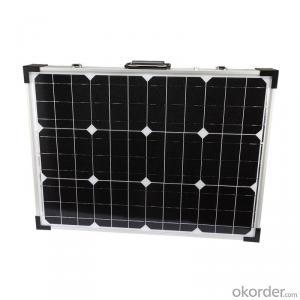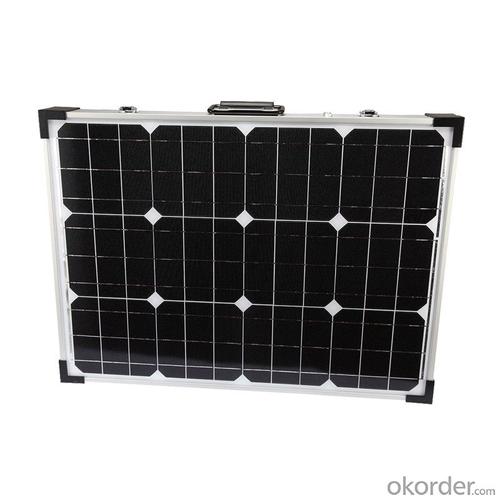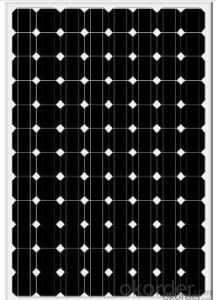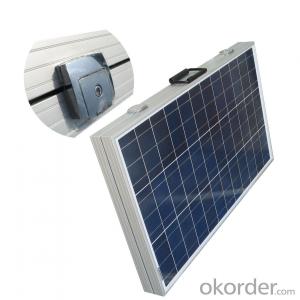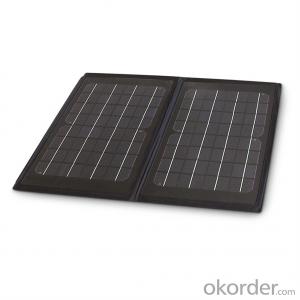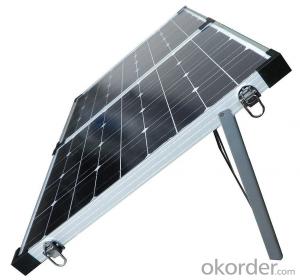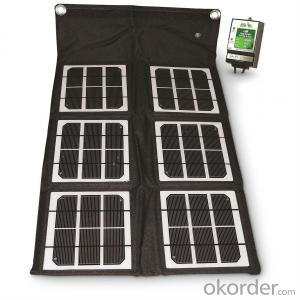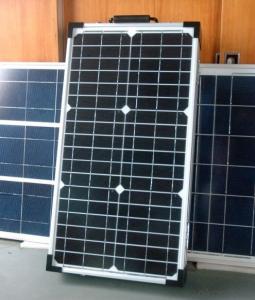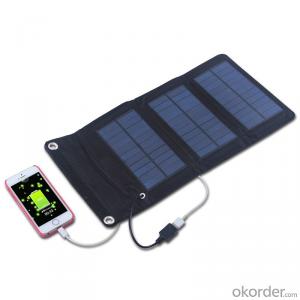Euro Solar Panels 30W Folding Solar Panel with Flexible Supporting Legs for Camping
- Loading Port:
- Shanghai
- Payment Terms:
- TT OR LC
- Min Order Qty:
- 1000 watt
- Supply Capability:
- 10000 watt/month
OKorder Service Pledge
OKorder Financial Service
You Might Also Like
Specification
Product Description
Folding module kits are designed to provide portable 12 volt power wherever you need it.PoPwer available from 20W to 240W
Features:
· Padded, moulded carry bag
· Heavy duty carry handle, hinges and clasps Stainless steel telescopic&adjustable legs
· Weatherproof solar charge controller with LED indicator
· 5m cable with heavy duty Anderson connectors between module-regulator & regulator-battery clamps
· All cabled up ready to use
· 2 year warranty
These kits are the ideal solution for 4WD, camping, caravaning, boating and recreational activities whereverpower is required for lights, small TV, camping fridge, pump or other small appliances.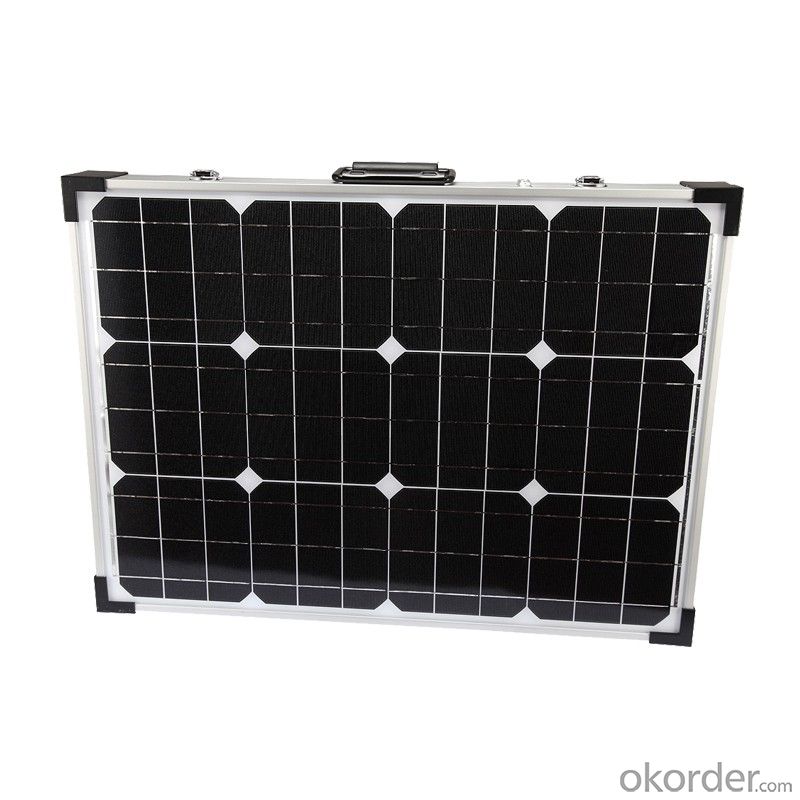
| Nominal Peak Power | 30W | 120W (2 x 60W) | 160W (2 x 80W) | 200W (2 x 100W) |
| Power tolerance | 3% | |||
| Cell type | Monocrystalline/Polycrystalline | |||
| Open circuit voltage (Voc) | 21.6V | |||
| Voltage at maximum power (Vmp) | 17.6V | 17.5V | 17.5V | 17.5V |
| Short circuit current (Isc) | 4.9A | 7.4A | 9.88A | 12.34A |
| Current at maximum power (Imp) | 4.54A | 6.86A | 9.14A | 11.42A |
| Maximum system voltage | 1000VDC | |||
| NOCT (Nominal Operating Cell Temperature) | 45 C +/-2 C | |||
| Operating temperature - module | -40 C to +85 C | |||
| Operating temperature – charge | -35 C to +55 C | |||
| Module folded size (mm) in carry bag | 505x550x60 | 505x825x80 | 505x1005x70 | 670x1005x70 |
| Module open size (mm) | 1014x550x30 | 1014x825x35 | 1014x1005x35 | 1344x1005x35 |
| Module net weight (kg) | 9.2 | 13 | 15.2 | 19 |
| Module gross weight (kg) | 11 | 16 | 19.4 | 23.2 |
| Solar charge controller | PWM 12V 10A; IP65 rated | PWM 12V 20A; IP65 rated | ||
- Q: Can solar panels be installed on a retirement home or assisted living facility?
- Yes, solar panels can be installed on a retirement home or assisted living facility. In fact, many such facilities are embracing solar energy as a sustainable and cost-effective solution. Installing solar panels can help reduce energy costs, decrease reliance on the grid, and contribute to a greener environment, all while providing clean energy for the residents.
- Q: I have 2 solar panels one is 5 watts 2 volts .2 amps or -The other is 50 watts 2 volts 2.6 amps or-Can I ...and what is the best way to hook them togeather to increase my amps being put back to my battery ?? I would be hooking them up to a 7 amp 00 watt charge controllerThe panels are rated 2 volt but the specs say they will produce more whennot connected to charge controllerPlease advise and should I even bother with the smaller panel ?
- You should probably ask this in the electronics section.
- Q: Can solar panels be installed on churches or religious buildings?
- Yes, solar panels can be installed on churches or religious buildings. In fact, many religious institutions have embraced solar energy as a way to reduce their carbon footprint and demonstrate environmental stewardship. Installing solar panels on these buildings can not only help generate clean and sustainable energy but also serve as a symbol of the organization's commitment to promoting renewable energy and responsible resource management.
- Q: Maximum size of solar panel i have to use is - 8 * 5 feet - this is the limitation given to us.
- If okorder . If you must store this energy, that's another trick involving other equipment.
- Q: Can solar panels be damaged by hail or extreme weather?
- Yes, solar panels can be damaged by hail or extreme weather. While solar panels are designed to withstand various weather conditions, including hail, severe storms with large hailstones or intense winds can potentially cause damage to the panels. However, most solar panels undergo rigorous testing to ensure they can withstand such conditions, and many manufacturers offer warranties to cover any damage caused by hail or extreme weather.
- Q: Can solar panels be installed on the ground instead of a roof?
- Yes, solar panels can be installed on the ground instead of a roof. Ground-mounted solar panels are a popular alternative when roofs are not suitable or available for installation. Ground-mounted systems offer flexibility in terms of placement, orientation, and size, making them an excellent option for maximizing solar energy production.
- Q: Is there a small solar panel system that I can put in my bedroom window and charge my phone and run an alarm clock off of? Or one I can run a microwave off of?
- You can cosider this product Flexible Personal Solar Panel. I think it will be helpful. Product Review Take the lightweight, easy-to-pack Brunton Solaris 6 / 2 Solar Panels on your next expedition to the Himalayas or down that nearby trail or dirt road. Brunton used CIGS, the most efficient thin-film solar technology available, to create the Solaris. Choose either the Solaris six-watt or 2-watt panel—both of them fold up to the size of a CD wallet and work, even in overcast conditions, to charge your cell phone, digital camera, camcorder, iPod, and other small electronics. A built-in reversing diode prevents the solar panel from discharging your batteries when the sun disappears for the night. Brunton's Solaris 2-watt panel can even charge your satellite phone or trickle charge your laptop.
- Q: Can we cover up solar panels on our house with regular siding?
- oh my goodness. make the investment aand update them
- Q: Can solar panels be installed on a pergola or awning?
- Yes, solar panels can be installed on a pergola or awning. In fact, they can be a great option for maximizing solar energy production while providing shade and protection from the elements.
- Q: does anybudy know about solar panels? plz reply me
- Solar okorder /
Send your message to us
Euro Solar Panels 30W Folding Solar Panel with Flexible Supporting Legs for Camping
- Loading Port:
- Shanghai
- Payment Terms:
- TT OR LC
- Min Order Qty:
- 1000 watt
- Supply Capability:
- 10000 watt/month
OKorder Service Pledge
OKorder Financial Service
Similar products
Hot products
Hot Searches
